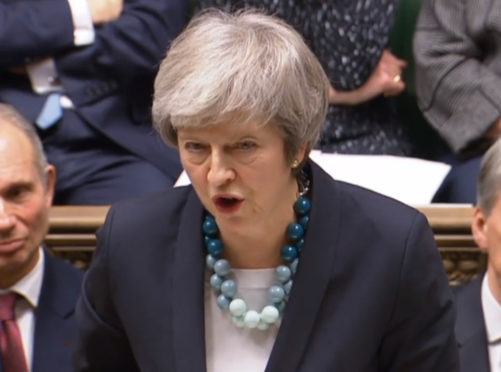Theresa May will today meet European leaders in an 11th-hour attempt to secure Brexit deal concessions after delaying the crunch Commons vote in a humiliating climb-down.
MPs were due to have their say on the negotiated withdrawal agreement and political declaration on the future relationship tonight.
But in the face of almost certain defeat – despite days of insistence the vote would not be pulled, and the visible anger of Commons Speaker John Bercow – the UK Government suspended debate on the issue.
Announcing her decision from the Despatch Box, a red-faced prime minister scrambling to save her career acknowledged there remained “widespread and deep concern” about the Northern Irish backstop.
A position of last resort, it is aimed at preventing a hard border on Ireland until a future EU-UK trade deal is agreed in the event this is not achieved by the end of the transition period in December 2020.
Concerns have been repeatedly raised, however, that the UK could be trapped in such a temporary customs arrangement indefinitely, as well as over the position of Northern Ireland.
Mrs May admitted yesterday that she could not win the scheduled vote.
She said: “If we went ahead and held the vote, the deal would be rejected by a significant margin.
“We will therefore defer the vote scheduled for tomorrow night and not proceed to divide the House at this time.”
She also revealed the government will step up its work in preparation for a no-deal outcome.
News of the desperate step leaked out minutes after the prime minister made an emergency phone call to her Cabinet.
As it was going on, her spokeswoman was still insisting the so-called meaningful vote would go ahead as planned.
But shortly afterwards, government sources were confirming the plan was indeed to postpone.
It provoked instant criticism from First Minister Nicola Sturgeon who called it an “act of pathetic cowardice by a Tory government which has run out of road and is now collapsing into utter chaos”.
She added: “It is final proof that the interests of a deeply-divided Tory party matter far more to the prime minister than people’s jobs and living standards.
“That is an unforgivable dereliction of responsibility, and the UK Government should now get out of the way and allow others to take charge.”
Labour leader Jeremy Corbyn also hit out at Mrs May, calling the decision a “desperate step” and adding: “We don’t have a functioning government … Labour’s alternative plan for a jobs-first deal must take centre stage in any future talks with Brussels.”
Mrs May told MPs she would now meet her counterparts in other member states and the leadership of the Council and the Commission in advance of the next European Council summit, due to take place at the end of the week, to discuss the “clear concerns” expressed by the House.
Meanwhile, Irish premier Leo Varadkar ruled out reopening negotiations around the Irish backstop.
The Taoiseach said it was not possible to reopen any aspect of the withdrawal agreement without reopening all aspects of it.
Mrs May, who answered questions on the floor of the House for just under three hours, told MPs she had hoped changes secured to the backstop would “reassure members that we could never be trapped in it indefinitely”.
She said: “The customs element of the backstop is now UK-wide. It no longer splits our country into two customs territories.
“This also means that the backstop is now an uncomfortable arrangement for the EU, so they won’t want it to come into use, or persist for long if it does.
“If our new relationship isn’t ready, we can now choose to extend the implementation period, further reducing the likelihood of the backstop coming into use.
“The treaty is now clear that the backstop can only ever be temporary – and there is now a termination clause.”
But she added: “I am clear from what I have heard in this place and from my own conversations that these elements do not offer a sufficient number of colleagues the reassurance that they need.”
Mrs May also revealed her government is looking at ways of “empowering” the Commons to “ensure that any provision for a backstop has democratic legitimacy and to enable the House to place its own obligations on the government to ensure that the backstop cannot be in place indefinitely”.
